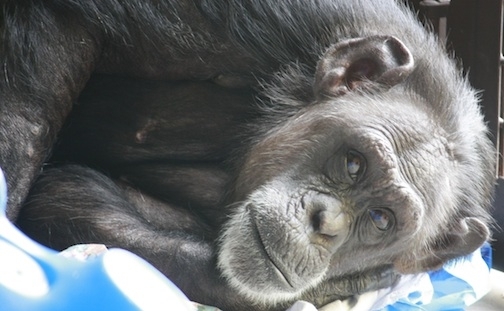
This Mother's Day, please help me pass legislation to end chimpanzee experiments. It makes ethical, scientific, and financial sense.
Jody is a mother who loves to curl up with a good magazine. Actually, she loves to curl up on top of a good magazine after she's carefully ripped out each page and added them to her pile of blankets and clothes. Jody lives at Chimpanzee Sanctuary Northwest, where the 36-year-old chimpanzee hones her skills at making the perfect nest for napping.
But Jody's life wasn't always rosy. For decades, she was used in laboratory experiments, caged in isolation, and separated from all nine of her babies. When she wasn't being used as a breeder to fill more laboratory cages with baby chimpanzees, she was the subject of painful hepatitis experiments.
This Mother's Day, honor the bond between mothers and their babies by asking your legislator to support a bill that would end the use of chimpanzees for lab tests.
This bill would rescue chimpanzees like Levi, one of Jody's sons who was taken away the day he was born in 1983. Levi now lives at a laboratory where he is used in invasive tests, despite the fact that many scientists agree: Chimpanzees make poor models for research into human diseases.
The Good News
The good news comes in the form of the Great Ape Protection and Cost Savings Act, a bill that already has dozens of supporters in Congress and would phase out the use of chimpanzees in invasive research. It would also release more than 500 federally owned chimpanzees -- like Levi -- to sanctuaries.
With calls to help chimpanzees in labs coming from the likes of Emily Deschanel, Jane Velez-Mitchell, Charlotte Ross, and Ricky Gervais, there's a good chance the bill will pass. Even former U.S. Ambassador to the United Nations, Governor Bill Richardson has stepped up to help chimpanzees in labs.
In addition, this bill fits in well with Congress' efforts to cut wasteful spending. The cost of supporting a single chimpanzee over the course of his or her lifetime can reach $750,000, and using just one chimpanzee in an experiment costs researchers an additional $70,000. In many cases, those costs are covered with federal funds -- funds that could be supporting less expensive and more effective research.
Life in a Lab
Life in a lab causes chimpanzees to suffer deeply. Like humans, chimpanzees have been found to exhibit post-traumatic stress disorder and depression. Even something as simple as drawing blood can cause extreme anxiety. Lab workers often wear biohazard suits and shoot chimpanzees with a dart gun to anesthetize them. When the workers approach, chimpanzees in other cages scream deafening distress warnings. Frequently, terrified chimpanzees are darted while on their perches, causing them to fall to the concrete with a heart wrenching thump. After they are anesthetized, they receive injections and repeated biopsies which invasively remove small samples of internal organs.
Although the physical pain these animals endure is alarming, the psychological suffering is even worse.
Chimpanzees are naturally social animals. Like people, they need to interact with others and be part of a community in order to maintain their psychological well-being, yet they are often caged alone for months or years on end. Separating these emotional beings from their mothers also has a devastating effect.
Many chimpanzees suffer permanent psychosis. Out of frustration, they bite themselves, pull their fur out, and frantically turn circles in their cages, day after day, decade after decade.
Bad Science
The reason to end chimpanzee experiments goes beyond ethics and finances. Science is also on the chimpanzee's side.
Undeniable evidence that chimpanzees make poor research models has many members of the scientific community shaking their heads. Chimpanzees have physiological differences that cause them to react to diseases in vastly different ways than humans.
For example, in more than a quarter century, more than 85 HIV vaccines were developed that demonstrated benefits in nonhuman primates but all failed in at least 200 human trials.
In 1997, a report by the National Research Council (NRC) concluded that chimpanzees were inadequate models for HIV research. A decade later, articles in the New England Journal of Medicine and the British Medical Journal came to the same conclusion.
All countries in the world have ended chimpanzee experiments except for the United States and the West African nation of Gabon. And even in the United States, most of the federally owned chimpanzees are not used in experiments but are warehoused at taxpayers' expense.
Meanwhile, human-centered studies, computer and mathematical modeling, and in vitro testing are leading the way in effective modern research. For example, VaxDesign's MIMIC System accurately assesses new drugs and vaccines in a more predictive and physiologically accurate way than using animals. And leading hepatitis C researchers are using human cell-based research methods instead of chimpanzees.
Let's move chimpanzees like Levi from lab cages to sanctuaries. By asking Congress to support the Great Ape Protection and Cost Savings Act, we can further science while supporting smarter federal spending. In the process, we can prevent more mothers from losing their babies to dead-end experiments.
This Mother's Day, please spare a thought for our chimpanzee sisters and their children and take action here to relieve them from pain, suffering and unnecessary experimentation.
